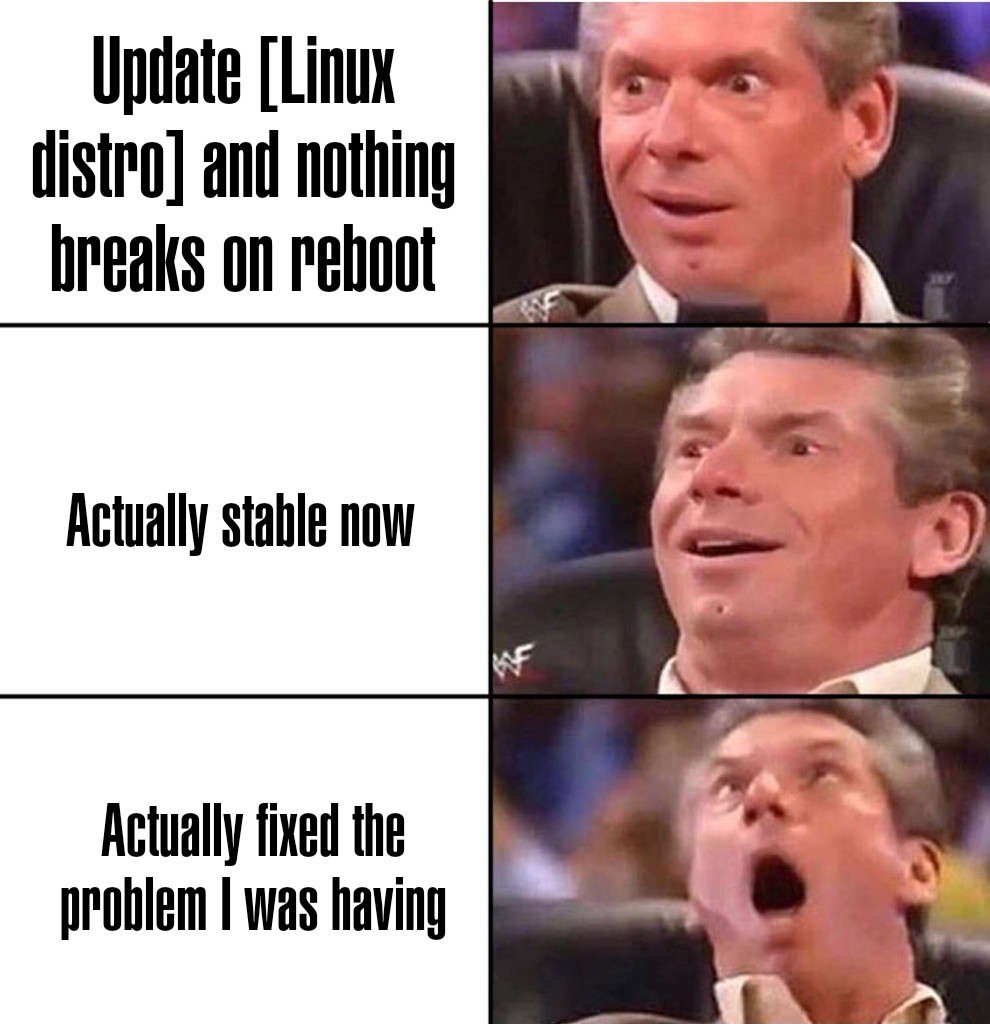Ohh, but the pain of discovering that it broke something important, but not often used, 3 months later....
linuxmemes
Hint: :q!
Sister communities:
Community rules (click to expand)
1. Follow the site-wide rules
- Instance-wide TOS: https://legal.lemmy.world/tos/
- Lemmy code of conduct: https://join-lemmy.org/docs/code_of_conduct.html
2. Be civil
- Understand the difference between a joke and an insult.
- Do not harrass or attack users for any reason. This includes using blanket terms, like "every user of thing".
- Don't get baited into back-and-forth insults. We are not animals.
- Leave remarks of "peasantry" to the PCMR community. If you dislike an OS/service/application, attack the thing you dislike, not the individuals who use it. Some people may not have a choice.
- Bigotry will not be tolerated.
- These rules are somewhat loosened when the subject is a public figure. Still, do not attack their person or incite harrassment.
3. Post Linux-related content
- Including Unix and BSD.
- Non-Linux content is acceptable as long as it makes a reference to Linux. For example, the poorly made mockery of
sudoin Windows. - No porn. Even if you watch it on a Linux machine.
4. No recent reposts
- Everybody uses Arch btw, can't quit Vim, <loves/tolerates/hates> systemd, and wants to interject for a moment. You can stop now.
Please report posts and comments that break these rules!
Important: never execute code or follow advice that you don't understand or can't verify, especially here. The word of the day is credibility. This is a meme community -- even the most helpful comments might just be shitposts that can damage your system. Be aware, be smart, don't remove France.
Ackshyually your distro can't get "stable" in an update. "stable" means that the distro should not have any new issues introduced with updates in the first place.
Ackshyually stable only relates to the release schedule. Stability is not reliability.
ackshyually, we are both right.
I would argue that the reason a slow release schedule is called stable because it aims to achieve stability and reliability.
Debian stable. I don't understand why people would want an unstable system.
I get wanting the latest applications, and by that I mean end-user tools one uses frequently, e.g. Blender or Steam, but for anything that those rely on, very very rarely does one genuinely need anything "new" urgently. I'd argue pretty much never but I'd be curious to discover counter examples. Just fa couple of days ago https://lemmy.ml/post/24882836/16154377 arguing about the topic too. Even for drivers for gaming, which are supposedly changing relatively "fast" there is rarely an actual need for it. Quite often it's a desire to get the latest but the actual impact is not that significant.
TL;DR: IMHO stable system with security updates running few bleeding edge apps isolated is the best compromise.
Now that you can get latest software from Flathub, there’s really nothing wrong with Debian “stable” except for more recent hardware support that requires newer kernel at the very least (recent userspace drivers will also come from Flatpak if the software like Steam is also a Flatpak). That is, if the stable repo has all you need and there’s no reason to supplement it with external packages.
There are however perfectly valid reasons for going with rolling to get recent improvements, which I for one care about. For example, now that PipeWire is pretty mature, Debian 13 will ship good version and it will serve well for the next 2-3 years, but some 2 years ago it was really important to get the latest and greatest to have good experience - and even early it was better than PulseAudio would ever be, just still improving rapidly, not ready for full freeze. Other example - KDE Plasma improved significantly from version 6.0 onwards introducing long awaited functionality like fractional scaling, HDR, but also improved stability and general polish. It will only be introduced in Debian 13, one full year after it was introduced.
Lastly, there’s nothing wrong with rolling and it isn't really “unstable”. Using Arch full time for the last 12 years, I only had like 2-3 situations when update actually broke something and it wasn’t my misconfiguration or a skill issue. Even then it could easily be avoided by using linux-lts kernel. In fact my Debian/Ubuntu installs were much less stable as there was always something missing that I needed (in era before Flatpaks or AppImages especially) relying on 3rd party apt repos, causing breakages and conflicts. I would usually upgrade Debian to testing or unstable anyway, so rolling, but one that’s actually open for breakage.
I’m on fedora 41 and gaming is almost perfect on it, the final hurdles are some VRR refinements and HDR. These are supposedly coming in f42 so I’d rather not wait god knows how long on Debian for these features to show up. However once the features arrive and I run into issues with F42, I’ll consider Deb.
I'm gaming pretty much daily, VR and flat, and... I don't even know what those abbreviations mean. I'm not saying these aren't important to you and other gamers but also want to suggest that a lot of "features" pushed by the industry are for other casual yet frequent gamers like me totally unimportant.
Upgrading my Nobara from 40 to 41 stopped my nvidia driver crashes in wayland for now, i hope it's not just a fluke :-)
On my new Lenovo with a brand install of Fedora, DNF was reporting 10KiB/s disk writes when installing packages. That was a long long upgrade but fortunately all that got fixed by the upgrade.
What is stable? I just run nix flake update then brew a coffee to accompany me for the next 12 hours
Which distro? I’ve upgraded Mint on the weekend. The installer failed with an error where i couldn’t get good infos about online.
Then i just rebooted the system out of frustration. Surprisingly it seems to work fine.
Is there a distro where upgrades just work? Maybe Fedora? Or i just install arch on the system, it works great on my server for the last 10 years without reinstall.
Debian in particular is rock solid, even Debian Unstable has been very reliable for me if you want a rolling release with newer packages.
But I've also had very few problems with Ubuntu. My mother has used it for ten years at this point and will happily apply any dist upgrade she's presented with, and rarely does she need support.
A pro tip is to check out the alternative desktop environments. A lot of people rightly hate Ubuntu's awful default DE, but it's not a core part of the distro, there are other complete desktop "flavours" available in the repositories and installers that will give you them from the start at https://ubuntu.com/desktop/flavours
(Switching an installed system from one DE to another is in principle as easy as uninstalling one desktop meta-package and installing another, but you got to make sure you get the right packages, or you might run into annoying conflicts, so I would not recommend it for a newbie)
Fedora and Arch are pretty good. The magic sauce (my guess) is that they both pretty much release just upstream software without trying to "fix" them unless things are totally broken.
EndeavourOS just works on my machine..
Works on my machine^tm
Ysk, the unicode number for ™ is 0x2122. You can type any unicode hexcode on linux by pressing Ctrl+shift+u followed by typing the code then pressing enter.
While I'm here, a couple other easy and handy unicodes to remember: en dash: – 0x2013 em dash: — 0x2014
Most people use a normal dash instead of these, but en and em dashes are technically more correct in some cases
Or you can do it on your phone by typing ™
Bazzite comes to mind.
Fedora also broke an update on my watch, but it backed up automatically so I reverted.
Atomic distros should be good in that respect, including atomic Fedora distributions (Silverblue/Kinoite/...)
Atomic Fedora variants. Updates literally mean replacing the system image, so there's nothing to really go wrong.
No such unicorn exists
nothing but lies
Is this some sort of Arch joke I'm too stable and usable to understand?
Windows: You got a kernel panic from an update just once this week? I went through two BSODs today!
Mac: It'd happen more often if I actually had software! You get everything!
Arch: While getting updates can cause crashes sometimes, new stuff is fun.
Debian: You guys are getting updates?
Debian: You guys are getting updates and crashes?
Oh we get updates, after all the other distros have spilled their blood all over them for us first. Why do you think they call it bleeding edge?
Backports don't count
😮why?
What? I never had an update break my system on Arch, even with nvidia proprietary drivers.
Me too 😆 after killing manjaro twice and pivoted to endeavourOS
I've had two instances in the past year on Purple Arch (Endeavor) where a kernel update "broke" my system. In both cases, the system still booted fine though, so not all definitions of "broken"may apply.
The first time there was a bug with the kernel drivers for my wireless card which caused a component of Network Manager to lag out the entire UI to the point it was basically unresponsive trying to find a connection, but never did.
The second time, it was a bug with the Vulkan drivers that caused all my games to crash within 60 seconds of starting up. Games are the main thing I use my PC for, so my system was effectively "broken", even though everything else was fine.
I am of course not discrediting your fortune - I merely wanted to share
Yea, that is not your system broken, but just an package update that was faulty, and probably fixed with an update a few hours later, isn’t it?
And you were able to role back such packages with yay/pacman, I suppose?
Is this how people can claim that Arch is stable, they just redefine breaking to exclude anything that might actually happen?
Yeah, kernel rollback fixed things no problem
I had issues with Arch all the time. Now is that the fault of my system being dodgy or my lack of skills? Probably. I even have wifi SOMETIMES not work on Mint.

2-3 years ago, an update to GRUB completely fucked the bootloader on Arch systems. I remember it well because it was the only time I was thankful for choosing Manjaro (which receives updates on a delayed schedule).
(edit) Found it! https://archlinux.org/news/grub-bootloader-upgrade-and-configuration-incompatibilities/ A breaking change in the GRUB configuration caused systems to become unbootable. Manual intervention was required to regenerate the config files (I think it was supposed to be handled by a pacman hook but can't be sure).
Next update: the same thing breaks again. After searching forums, you notice a pattern going back to 2002.
It's a meme because it's made up and never happens /s
It definitely happens if you upgrade to the next version of your distro while it's still in beta.
You hit a bunch of bugs, and they actually do get fixed around final release time.
Once you're on a stable branch, updates rarely include major changes.
When my arch testing prod server reboots cleanly after a kernel update

I updated the the other day and now my system boots to a grub prompt; I have to type exit and then it starts normally.
I'd figure out how to fix it, but I reboot so infrequently that I keep forgetting about it.
I feel like running grub-mkconfig -o /boot/grub/grub.cfg would probably fix that.
Disclaimer: I mostly have no idea what I'm talking about.
Yup! That's definitely the solution
Disclaimer: me neither
For what it's worth last time I broke an update fixing it ended up fixing a bunch of other issues I was having.
Lol, I run Alpine Linux on edge and nothing ever breaks on reboot.
What is there even in alpine, that can break? /s
Only what I install and little else?
Famous last words :p
